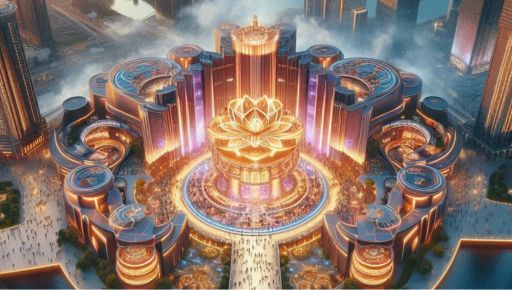Green Gaming: How Casinos are Embracing Sustainability in 2024

As concerns about climate change and environmental preservation grow, industries around the world are increasingly adopting eco-friendly practices—and casinos are no exception. Once associated with bright lights, luxury, and excess, casinos are now finding innovative ways to reduce their environmental impact and lead the charge toward a more sustainable future.
In 2024, many casinos are implementing cutting-edge initiatives, from energy-efficient buildings to zero-waste programs. Let’s explore how the casino industry is embracing sustainability and reshaping the gaming experience for environmentally conscious players.
Energy-Efficient Architecture: A New Standard for Casino Design
One of the most significant ways casinos are reducing their environmental footprint is through energy-efficient building designs. In 2024, new casinos are increasingly being constructed with sustainability in mind, incorporating eco-friendly features that minimize energy consumption and waste.
Casinos are adopting LEED (Leadership in Energy and Environmental Design) certification standards, which encourage sustainable building practices. This includes using energy-efficient lighting, HVAC systems, and high-performance windows that reduce the need for heating and cooling. Solar panels and other renewable energy sources are also being installed to generate clean energy on-site, reducing reliance on fossil fuels.
MGM Resorts International has been a pioneer in this space, introducing eco-friendly casinos like the ARIA Resort & Casino in Las Vegas, which has been awarded LEED Gold certification. ARIA’s energy-efficient design includes low-flow water fixtures, automated lighting controls, and an innovative air filtration system that drastically reduces energy use.
By building greener casinos, operators are not only reducing their environmental impact but also cutting operational costs—demonstrating that sustainability and profitability can go hand in hand.
LED Lighting and Smart Energy Management
Casinos are famous for their bright lights and elaborate displays, but traditional lighting systems consume massive amounts of energy. In 2024, many casinos are switching to LED lighting, which uses significantly less energy than traditional incandescent bulbs. LED lights are also more durable and last longer, reducing the frequency of replacements and cutting down on waste.
In addition to LED lighting, smart energy management systems are being implemented to optimize energy use throughout casinos. These systems monitor real-time energy consumption and adjust heating, cooling, and lighting based on occupancy and time of day. For example, lighting can be dimmed during off-peak hours or adjusted based on the amount of natural daylight entering the building.
These efforts not only reduce the casino’s carbon footprint but also create a more comfortable and adaptable environment for guests, enhancing the overall gaming experience.
Water Conservation Efforts: Reducing Waste and Protecting Resources
Water is another precious resource that casinos are working to conserve. Many casinos, especially those in desert regions like Las Vegas, are now focused on implementing water-saving initiatives to reduce consumption and waste.
In 2024, modern casinos are installing low-flow faucets, toilets, and showerheads to significantly reduce water usage in hotel rooms, restrooms, and kitchens. Some resorts are even reusing greywater for landscaping and irrigation, further cutting down on their overall water footprint.
Wynn Las Vegas is a standout example, having developed an on-site water treatment and recycling system that recycles millions of gallons of water each year. The system treats greywater from hotel rooms and restaurants and uses it for landscaping and cooling towers, helping reduce the resort’s overall water usage.
By prioritizing water conservation, casinos are taking active steps to protect a vital resource and setting a positive example for other industries.
Zero-Waste Programs: Tackling the Waste Problem
Casinos produce a significant amount of waste, from discarded food and packaging to paper and plastic used in gaming operations. However, in 2024, a growing number of casinos are adopting zero-waste initiatives aimed at reducing waste production and diverting as much as possible from landfills.
Casinos are partnering with recycling companies and introducing composting programs to manage organic waste from restaurants and buffets. Food scraps and biodegradable materials are composted, turning what would otherwise be waste into nutrient-rich soil for landscaping or local farms. In addition, many casinos have eliminated single-use plastics, replacing them with biodegradable or reusable alternatives.
Another key component of zero-waste programs is paperless gaming. Traditional casinos rely heavily on paper for receipts, tickets, and player tracking. However, casinos are now implementing digital alternatives, allowing players to track their points and transactions through mobile apps or digital cards. This shift not only reduces paper waste but also enhances the player experience by making it more convenient.
Renewable Energy: Powering the Future of Green Casinos
Many casinos are investing in renewable energy sources like solar and wind power to reduce their reliance on non-renewable energy and minimize greenhouse gas emissions. By integrating renewable energy into their operations, casinos can produce clean energy on-site, reducing both costs and their environmental footprint.
In Las Vegas, Mandalay Bay Resort has installed one of the largest solar panel arrays on the Las Vegas Strip, covering nearly 20 acres of its rooftop. This massive solar installation provides a significant portion of the resort’s energy needs, helping reduce carbon emissions and energy consumption.
Similarly, some casinos are exploring geothermal energy for heating and cooling, particularly in regions where geothermal resources are abundant. These innovations highlight the industry’s commitment to sustainability and the potential for renewable energy to power the future of gaming.




